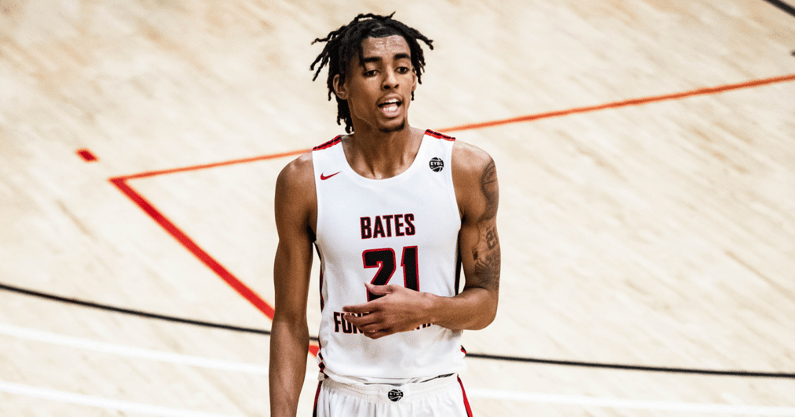In this age of monetizing one’s brand, trademarking one’s brand is important

When Elgin Bates filed with the United States Patent and Trademark Office on April 6 to register a standard character trademark for his 17-year-old son’s first name, Emoni, it may have seemed like an unusual move for a parent of a high school junior. But it was especially prudent for the elder Bates, who sought to obtain trademark protection for his son’s name on apparel such as hats, sweatpants, sneakers, T-shirts and long-sleeved shirts.
A household name in basketball circles since middle school, Emoni Bates, at the time of the filing, was just a few months away from reclassifying, enrolling at Memphis and perfectly positioning himself to begin monetizing his brand during the first year of the NIL era.
Bates is among a host of recognizable college names — including UConn women’s basketball star Paige Bueckers, Wisconsin quarterback Graham Mertz and Pitt quarterback Kenny Pickett — to have trademark applications filed on their behalf in recent months. Securing a trademark registration for a logo, slogan, name or catchphrase prevents others from distributing products bearing those words or symbols without the athlete’s permission. And in this new age of monetizing one’s brand, protecting one’s brand is of paramount importance.
“It is going to be a crucial component,” Dale Hutcherson, a Memphis-area attorney who specializes in sports and trademark law, told On3. ”Some college athletes want to start their own clothing brands, but once they get those ideas rolling, they’ll maybe see some pirates out there who want to steal those ideas. If you have an idea, especially for a brand or for goods and services, you need some mechanism to protect that.”
The early part of the NIL era has been a dizzying, fast-evolving period, and not all athletes who have planned to unveil clothing lines have filed to register trademarks. In early August, Ole Miss quarterback Matt Corral announced the reveal of his “Manifest and Conquer” apparel line. But a search of the USPTO database did not immediately show a filing on Corral’s behalf. Multiple emails to Ole Miss’ compliance officers were not returned.
Speaking in general on the topic, Malik S. Jackson, a Jacksonville-based attorney who counsels clients on NIL matters, told On3 that “it is concerning for an athlete to have a clothing line — or other intellectual property — without trademark protection.”
“Many athletes lack representation, savvy and a desire to take the necessary steps to protect their intellectual property,” Jackson said. “Simply put, college students want to gin up revenue and learn about business without retaining adequate counsel.”
As a cautionary tale, Jackson pointed to the case of NBA star Kawhi Leonard, who lost his copyright lawsuit against Nike over the “Klaw” logo.
Top 10
- 1Breaking
Johntay Cook
Texas WR, Huskies part ways
- 2
Transfer Portal window
Coaches propose big change
- 3Hot
Sanders addresses rumors
Prime talks Cowboys job
- 4
Fake injuries
New rule under discussion
- 5Trending
Kiffin jabs Saban
Sydney Thomas pic sparks shot
Get the On3 Top 10 to your inbox every morning
By clicking "Subscribe to Newsletter", I agree to On3's Privacy Notice, Terms, and use of my personal information described therein.
So what should entrepreneurial-minded college athletes do? Hutcherson said the first step is to consult with a trademark attorney so they can do their due diligence with the USPTO to determine if the specific trademark the athlete is seeking is available. If the athlete then decides to move forward in the process, the attorney can file an intent to use application so the athlete can “have it locked in” before any merchandise is produced.
Then, Hutcherson said, the attorney can make a proof of use filing, showing that the athlete is selling merchandise bearing the marks. The athlete gets a trademark registration, which can be enforced against anyone that may be attempting to use the marks. The entire registration process, he said, could take three to six months. But for an athletes’ clothing line specifically, he stressed that it’s a necessary element.
“When it comes to the athletes that have this entrepreneurial spirit and want to start these brands, that’s where the education might have to amp up a little bit,” Hutcherson said. “I hope that (this is the case) for these college athletes, especially when they are in this stage of life where learning how to be an entrepreneur is so important.”
Quick hits
+ Icon Source, a digital marketplace connecting brands and athletes, announced Tuesday the launch of Icon Access, an incentive program that offers athletes access to brand discounts, special offers and cash incentives. Athletes receive exclusive perks regardless of sport while also increasing their exposure to participating brands for sponsorships and paid partnerships. The program is expected to generate more than $25 million in value to athletes within the first year. The inaugural program features discounts offered from brands that include YouTube, Spartan Races, Freshly, Mossy Oak, Wild Mike’s Ultimate Pizza and OtterBox.
+ College Hunks Hauling Junk and Moving, a company that handles moving and so-called junk-hauling needs, announced a broad endorsement deal with the San Diego State football team. The company says the deal marks the largest number of athletes in a single sport to be offered a sponsorship deal at one time. Sixty players have opted into the deal. The sponsorship, which runs through the 2021-2022 school year, was facilitated and vetted by the NOCAP Sports platform, a free-to-use digital marketplace that allows athletes and businesses to connect.